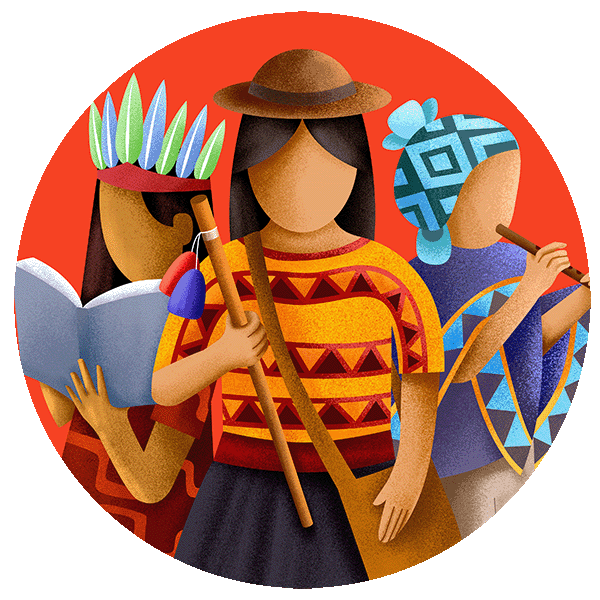
Decolonize Justice Systems! An Interview With Dine' Lawyer Michelle Cook
In many Indigenous communities, dual justice systems operate in tandem: the European system, a colonial imposition characterized by hierarchical, punitive, written codicies, and the Indigenous system, which is often based in tradition and holistic in nature.
Human Rights Lawyer Michelle Cook (Dine') elaborates on the interactions between these two systems, and explains how communities can use the language of human rights to challenge the colonial legal system imposition in order to gain a seat at the table as independent nations with internationally recognized justice systems.
Indigenous Peoples Day In Nepal
The International Day of the World’s Indigenous Peoples is commemorated annually on 9 August. Ten years after the adoption of the United Nations Declaration on the Rights of Indigenous Peoples, Nepal-based Indigenous Rights Radio Producer Dev Kumar Sunuwar reflects with prominent Nepali Indigenous leaders on the country's progress in the implementation of international standards for Indigenous Rights.
International World Indigenous Peoples Day 2017
The International Day of the World’s Indigenous Peoples is commemorated annually on 9 August. Ten years after the adoption of the United Nations Declaration on the Rights of Indigenous Peoples, progress has been made in terms of the formal recognition of Indigenous peoples in several countries, but Indigenous peoples overwhelmingly continue to face discrimination, marginalization and major challenges in enjoying their basic rights.
UN Special Rapporteur Vicky Tauli-Corpuz Finds Inadequate Consultation Process in Honduras
Vicky Tauli-Corpuz, UN Special Rapporteur on the Rights of Indigenous Peoples, says she has found an inadequate process of consultation with Indigenous communities on the part of the national government during her visit to Honduras, where she was recently invited for a working visit to comment on a draft of a law regulating Free, Prior and Informed Consent. Indigenous Hondurans do not feel that they were adequately consulted on the content of the law. Further, the law does not meet widely accepted international standards of F.P.I.C.
UN Special Rapporteur Vicky Tauli-Corpuz on the Criminalization of Australian Aboriginal Peoples
Vicky Tauli-Corpuz, UN Special Rapporteur on the Rights of Indigenous Peoples, discusses with IRR Producer Shaldon Ferris the high rate of imprisonment of Australian Aboriginal individuals that she observed in her official visit to Australia. Disproportionate criminalization of Aboriginal people is evidence of systemic, structural inequality in Australia.
MUSIC
Song: "YAWLICHALLAY" by Luis Cisneros. Used with permission.
Consultation and Consent
Avexnim Cojti (Maya K'iche') highlights the difference between consent and consultation with the help of Joan Carling, longtime advocate for Indigenous rights and former expert member to the UNPFII, in the context of decisions made by Indigenous communities regarding resource and land management. Joan explains that consent (or refusal of consent) is given at the conclusion of a process of consultation. Consultation, defined as an open, collective deliberation, is a crucial precursor to Free, Prior, and Informed Consent.
MUSIC
"Yawkuchallay," by Luis Cisneros
UNDRIP Article 22: Protection for Children, Elders, Women, and Individuals with Disabilities
Article 22 of the UN Declaration on the Rights of Indigenous Peoples states 1. Particular attention shall be paid to the rights and special needs of Indigenous elders, women, youth, children, and persons with disabilities in the implementation of this Declaration. 2. States shall take measures, in conjunction with Indigenous peoples, to ensure that indigenous women and children enjoy the full protection and guarantees against all forms of violence and discrimination. PRODUCTION Script by Shaldon Ferris (KhoiSan) Voiceover by Morisca Christians MUSIC “Dannyco” by The Hot Shots Dance Band
UNDRIP Article 14: Right to Education
Article 14 of the UN Declaration on the Rights of Indigenous Peoples states:
1. Indigenous peoples have the right to establish and control their educational systems and institutions providing education in their own languages, in a manner appropriate to their cultural methods of teaching and learning.
2. Indigenous individuals, particularly children, have the right to all levels and forms of education of the State without discrimination.
UNDRIP Article 13: Right to Language
Article 13 of the UN Declaration on the Rights of Indigenous Peoples states:
1. Indigenous peoples have the right to revitalize, use, develop and transmit to future generations their histories, languages, oral traditions, philosophies, writing systems and literatures, and to designate and retain their own names for communities, places and persons.
and
UNDRIP Article 12: Spiritual and Religious Freedom
Article 12 of the UN Declaration on the Rights of Indigenous Peoples states:
1. Indigenous peoples have the right to manifest, practice, develop and teach their spiritual and religious traditions, customs and ceremonies; the right to maintain, protect, and have access in privacy to their religious and cultural sites; the right to the use and control of their ceremonial objects; and the right to the repatriation of their human remains.
and
